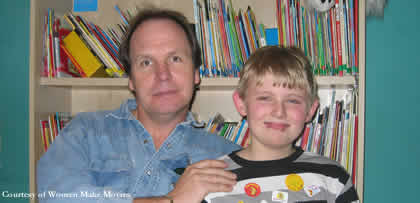 Hold Me Tight, Let Me Go has its national broadcast premiere on Tuesday, July 28, 2009, at 10 p.m. on PBS during the 22nd season of POV (Point of View). American television’s longest-running independent documentary series, POV is the recipient of a Special Emmy for Excellence in Television Documentary Filmmaking. The series continues on Tuesdays at 10 p.m. through Sept. 22 and returns with two specials in November and December.
Hold Me Tight, Let Me Go has its national broadcast premiere on Tuesday, July 28, 2009, at 10 p.m. on PBS during the 22nd season of POV (Point of View). American television’s longest-running independent documentary series, POV is the recipient of a Special Emmy for Excellence in Television Documentary Filmmaking. The series continues on Tuesdays at 10 p.m. through Sept. 22 and returns with two specials in November and December.
In Hold Me Tight, Let Me Go, one of Britain’s leading documentary filmmakers takes a vérité look at Oxford’s Mulberry Bush School for emotionally disturbed children. Mulberry’s heroically forbearing staff greets extreme, sometimes violent behavior with only consolation and gentle restraint. Kim Longinotto’s unblinking camera captures an arduous process and a nearly unhinged environment, but it also records the daily dramas of troubled kids trying to survive and the moments of hope they achieve with Mulberry’s clear-eyed staff.
The kids ages five through 12 who attend Mulberry (most of them boys) can broadly be described as having attachment disorders, with some having Attention Deficit Disorder (ADD), Attention Deficit Hyperactivity Disorder (ADHD) and Oppositional Defiant Disorder (ODD). Hold Me Tight, Let Me Go introduces five of Mulberry’s students over the course of a year.
Kim Longinotto, Director/Producer/Cinematographer says: “When I first went to see the Mulberry Bush School, within 20 minutes of arriving, I knew I wanted to make a film there. I remembered that during my own school days, the driving force behind everything was punishment and discipline. You were constantly in fear and you didn’t feel good. The aim of the school was to break down your self-esteem. By contrast, at Mulberry the goal is to help the kids feel happier and more confident. When they misbehave, the teachers don’t punish them, but try to find out why they are acting like that.  The way I heard adults speaking to children was so different from anything I had experienced, either with my parents or at school. As I filmed and then completed Hold Me Tight, Let Me Go, I was really touched by the kids’ mix of rebelliousness, sadness and wisdom. I realize more and more how wise children are, and how often we don’t respect them very much.”
The way I heard adults speaking to children was so different from anything I had experienced, either with my parents or at school. As I filmed and then completed Hold Me Tight, Let Me Go, I was really touched by the kids’ mix of rebelliousness, sadness and wisdom. I realize more and more how wise children are, and how often we don’t respect them very much.”
As part of Britain’s post-war reconstruction, renowned psychologist Barbara Dockar-Drysdale founded the Mulberry Bush School in 1948 with her husband, Stephen, to help children traumatized by World War II. The couple had looked after children who had been evacuated from London during the wartime blitz. Dockar-Drysdale published a 1958 paper, “The Residential Treatment of Frozen Children,” which offered clinical stories about working closely with the most “cold” and “hardened” of children. She described them as emotionally “frozen” at the “point of failure” of their original relationships at home.
Dockar-Drysdale and her staff built on the concepts of various experts, including psychoanalyst Bruno Bettelheim, whose 1950 book, Love is Not Enough, described the treatment of severely emotionally disturbed young people at the Orthogenic School in Chicago. His work was informed by his own experience of the institutionalization of hatred in the Nazi concentration camps. Sue Gerhardt’s 2004 book Why Love Matters validated Dockar-Drysdale’s theories and described how the brain of the human baby physically enlarges as a result of being in a loving relationship. By contrast, if the baby experiences ongoing neglect and abuse, the evolving brain is flooded with the hormone cortisol, which can “freeze” the growth of the brain. www.mulberrybush.oxon.sch.uk/.

